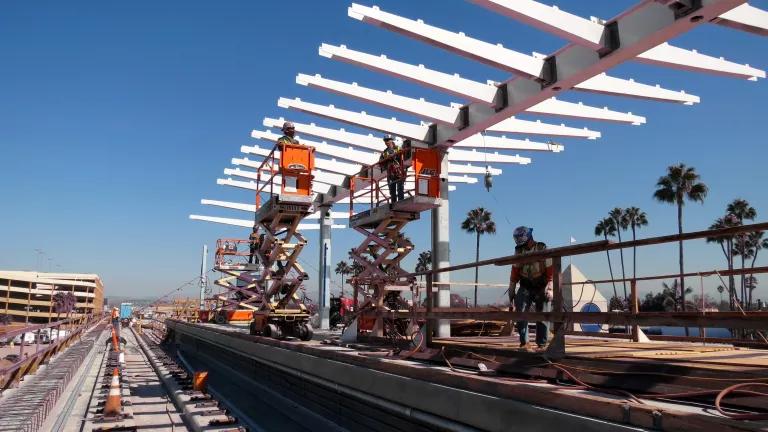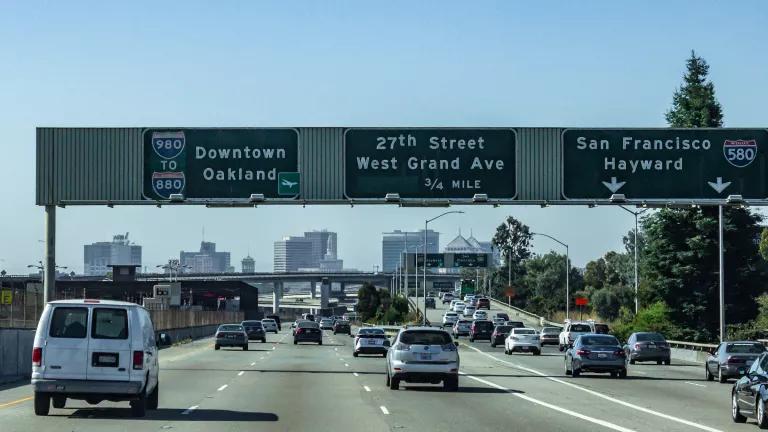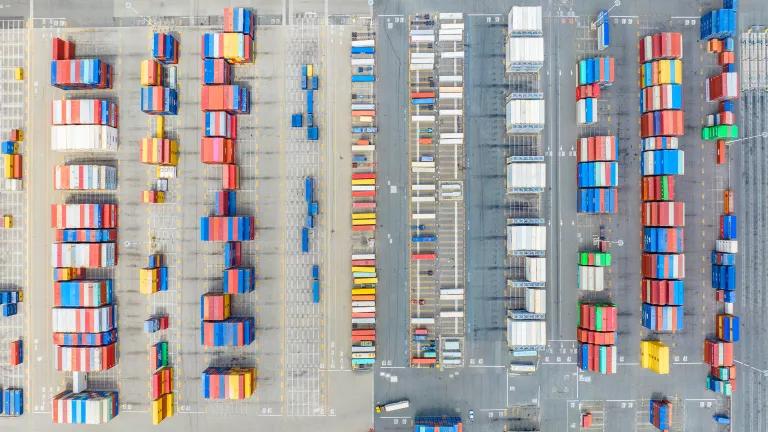Reading the News: Highway Widenings Are Undermining Climate Goals
National, state and local news outlets have picked up on a key theme: reaching our ambitious climate goals requires rethinking how we invest in transportation.

A smoggy red sunset matches taillights of traffic on the Harbor Freeway in Los Angeles. Photo via the Metro Los Angeles Library and Archive.
Photo via the Metro Los Angeles Library and Archive.
Top Line: Highway expansions that cram even more cars onto congested roads are undermining our climate goals and worsening air quality at a time when we need to go all-in on investing in clean transportation. Several media outlets have recently applied welcomed scrutiny to highway widenings. In California, three projects are under the spotlight from air quality regulators for some questionable claims that Caltrans has made, understating the environmental impacts of highway expansions.
Bottom Line: We know widening congested roads won't bring traffic relief. But investing in clean mobility choices can offer Americans more ways to get around and avoid traffic. States have unprecedented flexibility to spend federal dollars on climate-friendly mobility, but they have to act.
Washington Post: Will America ever stop building more highways?
The Post highlights the national movement to reprioritize infrastructure funding from highway expansions to projects that provide more low carbon mobility like rail, subways, biking and walking paths, as well as maintenance of our existing roads system. A coalition of 200 organizations, including NRDC, signed a letter calling for a moratorium on highway expansions.
Los Angeles Times: California says it prioritizes climate goals over freeway widening. So why is the 15 Freeway getting more lanes?
The Times digs into a plan to widen I-15 in in heavily pollution-burdened communities in Riverside and San Bernardino. State and local officials claimed in an important Clean Air Act process that the widening would not cause any more diesel truck trips. And then in an application for state Trade Corridor Enhancement Program funding for the project, officials claimed that daily truck traffic would jump 20%. The Times reports that "the U.S. Environmental Protection Agency is now looking into allegations that the San Bernardino County Transportation Authority and the California Department of Transportation may have misled it about the potential environmental harm the project could cause communities that breathe in some of the nation’s worst air."
Sacramento Bee column: Newsom vs Newsom. Air Board, Caltrans clash on 80/50 widening plan. Who is in charge?
Columnist Tom Philip dives into the additional (and welcome) scrutiny that the California Air Resources Board is bringing to bear on Caltrans-proposed highway widenings. He highlights a key finding that "California Air Resources Board says Caltrans underestimated greenhouse gas emissions and overstated the benefits of adding a lane each way."
Fresnoland: Biden administration steps in on Caltrans’ highway expansion in Fresno
The Biden Administration is probing a planned interchange expansion in South Fresno. The project will have to revisit conclusions about its pollution impacts. Fresnoland reports that federal court filings show U.S. Transportation Secretary Pete "Buttigieg and FHWA chief Shailen Bhatt expressed concerns that the FHWA may have failed to follow proper protocol under the Clean Air Act when it exempted the Caltrans projects from the required analysis."
Members of the Campaign for Sustainable Transportation and the Sierra Club in the Santa Cruz area have filed a lawsuit against Caltrans over a planned widening of Highway 1. The proposed project would result in cutting down 1,141 trees. Caltrans's environmental analysis shows congestion would be scarcely better, and in some cases worse, after the project opens, per CST.




